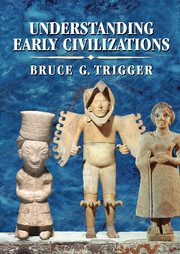Book contents
- Frontmatter
- Contents
- List of Illustrations
- Preface
- Understanding early civilizations
- Introduction
- 1 Rationalism and Relativism
- 2 Comparative Studies
- 3 Defining ‘Early Civilization’
- 4 Evidence and Interpretation
- Sociopolitical organization
- Economy
- Cognitive and symbolic aspects
- Discussion
- References
- Index
3 - Defining ‘Early Civilization’
Published online by Cambridge University Press: 05 June 2014
- Frontmatter
- Contents
- List of Illustrations
- Preface
- Understanding early civilizations
- Introduction
- 1 Rationalism and Relativism
- 2 Comparative Studies
- 3 Defining ‘Early Civilization’
- 4 Evidence and Interpretation
- Sociopolitical organization
- Economy
- Cognitive and symbolic aspects
- Discussion
- References
- Index
Summary
Identifying early civilizations for comparative study requires ascertaining the general features that distinguish them from both simpler and more complex societies. Such criteria do not constitute an ‘ideal type’, which, according to Max Weber (1949), seeks to order reality by selecting and accentuating certain elements of it. Instead, they identify a natural but not necessarily exclusive category within which it is possible to conduct a more detailed study of differences and similarities. Nevertheless, even postulating such a category as ‘early civilizations’ attracts charges of subjectivity and ethnocentric bias. Do early civilizations constitute a natural class that is susceptible to the kind of comparative study I am proposing? Does degree of complexity have any real meaning? Is it possible to measure complexity objectively? Do not fundamental historical differences render all societies inappropriate for comparative analysis? Extreme relativists would answer the last question with a resounding yes.
‘Early civilization’ is undeniably an evolutionary concept. It assumes the existence of less complex societies, some of which evolved into early civilizations, and more complex ones, which either developed out of early civilizations or grew up alongside of and ultimately replaced them. The aim of my research is not to evaluate the concept of sociocultural evolution (but see Trigger 1998a) or to try to account for how and why early civilizations developed. Yet, in order to demonstrate that the societies I am examining are at the same level or stage of development, it is necessary to argue that sociocultural evolution is a valid scientific concept.
- Type
- Chapter
- Information
- Understanding Early CivilizationsA Comparative Study, pp. 40 - 52Publisher: Cambridge University PressPrint publication year: 2003



